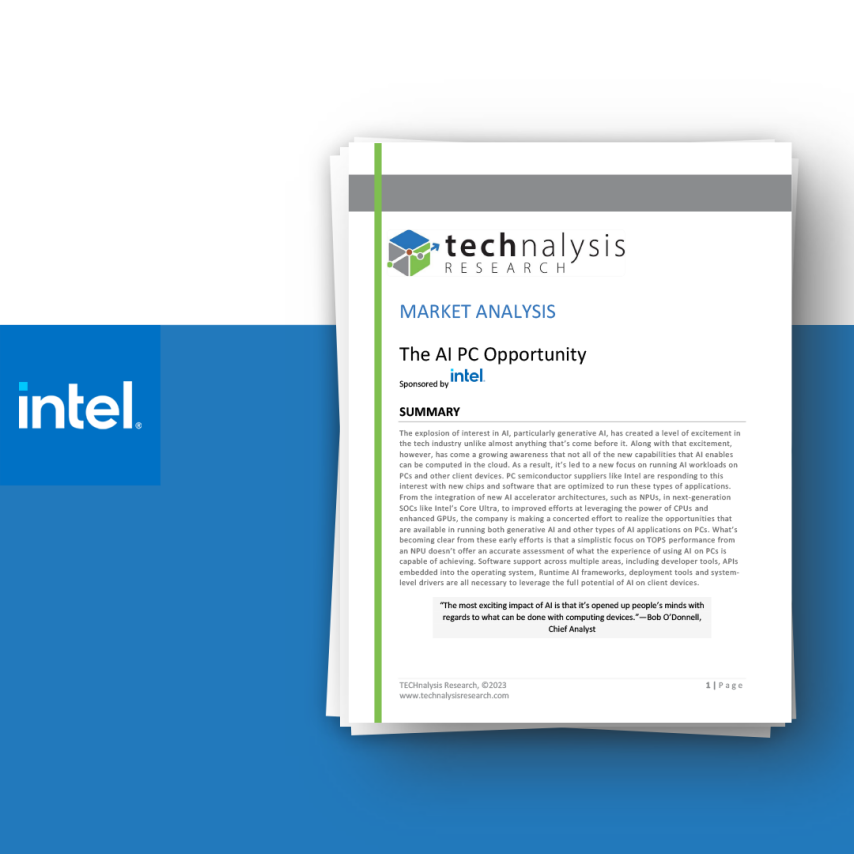TECHnalysis Research: The AI PC Opportunity
Leverage the Full Potential of AI on PCs
The explosion of AI has created excitement within the tech industry, but along with that excitement has come a growing awareness that the cloud may not be big enough to run all AI applications. Beyond the limitation in limited infrastructure, many companies are considering the security and privacy concerns of sending data to the public cloud. Enter, the AI PC. The past year has seen the launch of several new PC SOC (System on Chip) architectures that can be leveraged to run AI workloads in more powerful and efficient ways than ever before. One strong example of this is the new Intel Core Ultra processors, which include more flexible CPUs, more powerful GPUs, and a new type of component called NPUs (Neural Processing Units) that are specifically optimized for many types of AI workloads. This Intel-sponsored whitepaper from Bob O’Donnell at TECHnalysis Research looks at the current AI PC opportunity – one that is truly once-in-a-generation – and expounds upon why the PC is being reborn in a new and exciting way.

Until now, most of the focus for AI-powered computing has been on applications and services running in the cloud. However, running these kinds of applications directly on PCs has tremendous advantages. Consider these facts:
There has been a recent and rapid evolution of technology. The shrinking of open-source foundation models, along with technology advancements such as model quantizing, are suddenly making on-device AI solutions possible now. In fact, the pace of innovation happening on devices is even faster than the overall speed at which GenAI advancements have been occurring.
The existing cloud infrastructure can’t support demand. A big part of the reason for the rush for on-device AI stems from very practical issues. Most notably, there’s been a widely acknowledged recognition that—based on the incredible speed of adoption of GenAI tools and the huge array of new offerings coming online—the existing public cloud data center infrastructure simply can’t support the expected demand.
Performance and output can be better when running locally. Running AI applications directly on PCs and other client devices is not only possible but in many situations, the performance and the output can be better when running locally.
Greater privacy and security. Your data is significantly more secure when you can leverage data on your own device and not send any of it out to a public cloud environment.
4 Key Takeaways
The Importance of a Balanced SOC. 2023 has seen the launch of several new PC SOC (System on Chip) architectures that can be leveraged to run AI workloads in more powerful and efficient ways than previous iterations. Chips like the new Intel Core Ultra processors now include more flexible CPUs, more powerful GPUs, and a new type of component called NPUs (Neural Processing Units) that are specifically optimized for many types of AI workloads.
The importance of the right AI Software Tools. In addition to system-level enhancements, getting the best possible performance from a given application typically entails working directly with software developers to ensure that their code is optimized for a given architecture. This is where Intel’s size and its huge range of on-staff software developers can often prove to be an advantage because of their ability to reach out to and work with many ISVs (independent software vendors) working on AI-powered PC applications.
PC AI Applications are only getting better. Several PC applications and system-level functions that leverage AI functionality are already on the market. Microsoft’s Windows Studio Effects features—which have been specifically optimized to run on the NPUs on PCs that have them—offer enhanced video background blurring and improved audio noise reduction in real-time messaging functions.
PCs are being reborn. From exciting advancements in silicon architectures to important developments in PC-based software applications and tools, the PC is being reborn in a new and exciting way.
“The rapid evolution and shrinking of open-source foundation models along with technology advancements such as model quantizing are suddenly making things that many industry observers didn’t expect to happen on client devices for several years possible in the next few months.”
Bob O'Donnell, TECHnalysis Research
“Issues around cost, security, and efficiency all point to the fact that running all—or even most—AI workloads in the cloud simply isn’t a sustainable, long-term option. As a result, on-device AI solutions are quickly becoming essential to ensure that the momentum around AI-powered applications can continue to grow. More of these AI workloads simply have to move onto PCs.”
Bob O'Donnell, TECHnalysis Research
AI PCs for Business
Intel is bringing the AI PC to business. Users get the performance they need, while IT can simplify.
A vast AI PC ecosystem
Learn how Intel and our partners are making AI faster, easier, and more accessible.
What is an AI PC and how can It help me?
Everyone is buzzing about the “AI PC,” and defining it is easy.